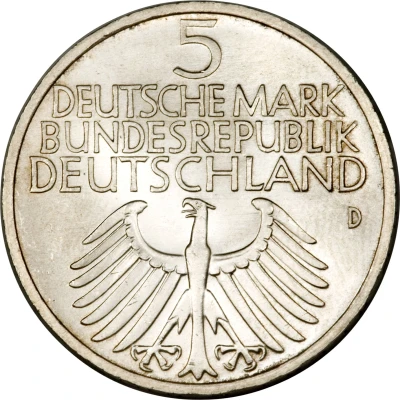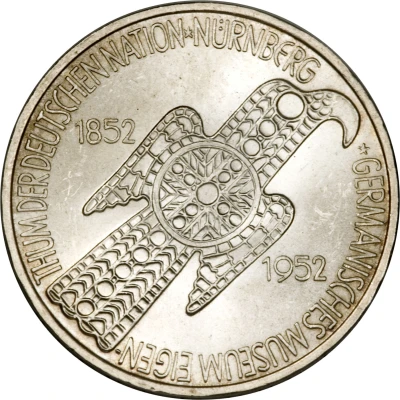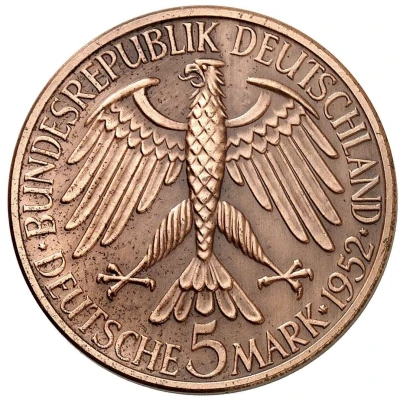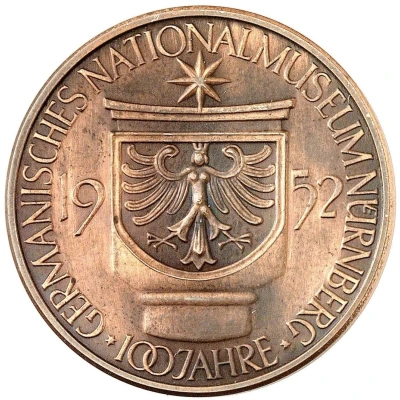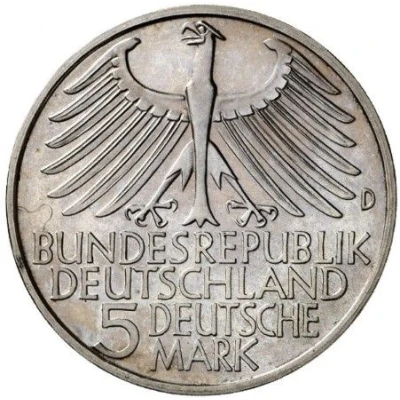
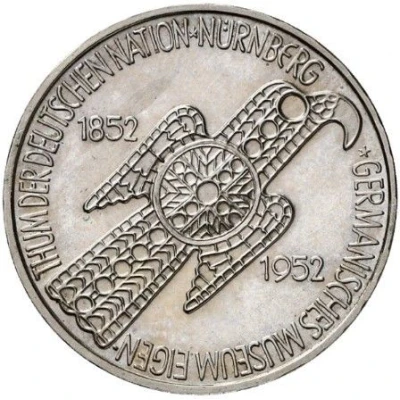

© Fritz Rudolf Künker GmbH & Co. KG, Osnabrück and Lübke & Wiedemann KG, Leonberg
5 Deutsche Mark Germanic Museum - Pattern
1952 year| Silver (.625) | 9.85 g | 28.08 mm |
| Issuer | Federal Republic of Germany |
|---|---|
| Period | Federal Republic (1949-date) |
| Type | Pattern |
| Year | 1952 |
| Value | 5 Deutsche Mark (5 DEM) |
| Currency | Deutsche Mark (1948-2001) |
| Composition | Silver (.625) |
| Weight | 9.85 g |
| Diameter | 28.08 mm |
| Shape | Round |
| Technique | Milled |
| Orientation | Medal alignment ↑↑ |
| Demonetized | Yes |
| Updated | 2024-10-05 |
| Numista | N#307917 |
|---|---|
| Rarity index | 95% |
Reverse
Eagle brooch of Germanic Museum Nürnberg facing left
Script: Latin
Lettering:
*GERMANISCHES MUSEUM EIGEN- THUM DER DEUTSCHEN NATION*NÜRNBERG
1852
1952
Engraver: Karl Roth
Edge
Smooth with inscriptions
Lettering: EINIGKEIT UND RECHT UND FREIHEIT
Translation: Unity, justice and freedom
Comment
Compared to the realized 5 DM commemorative coin "Germanisches Museum" (J. 388), this specimen has a clearly different reverse with the value numeral "5" below the federal eagle. Rudolf Schaaf writes in his book "Die Proben der Deutschen Münzen seit 1871" that according to information from the widow of the Munich medalist Karl Roth, the design of this reverse depicted here was actually preferred by the artist. However, due to the "recognizability of the five-mark value", the decision for the later minted pieces of J. 388 fell on the well-known motif with the eagle below the value indication. Schaaf knows the reverse depicted here only as a one-sided plaster cast and not in a distinct form.The idea and initiative for the first commemorative coin in the Federal Republic came from the Bavarian Stateministry of Culture. The celebrations of the 100th anniversary of the Germanic National Museum in Nuremberg provided the occasion for the minting of this commemorative coin. Although the Germanic Museum was the first commemorative minting of the FRG, the production of special issues or commemorative coins was new territory neither for the responsible Ministry of Finance nor for the executing mint in Munich. Commemorative coins had already been minted in the Weimar Republic, the Third Reich and also in the GDR. Nevertheless, the process leading up to the determination of the exact design for J. 388 was by no means smooth.
At the beginning there was an artist competition, in which a jury had awarded the design of Karl Roth with the first prize. This first design here shows the familiar eagle brooch on the obverse, but at a much steeper angle (an illustration of this obverse can be found in the 15th edition of Kurt Jaeger's catalog, among others), and on the reverse is the federal eagle above the four-line script with the value indication. On October 24, 1952, Roth sent this version, along with another revised design, to Federal President Theodor Heuss for presentation. The second design showed the non-prizewinning reverse with the value numeral at the top, as we know it today from the Germanic Museum. After review, Theodor Heuss informed that he would prefer the second design of the reverse due to the "better recognizability of the five-mark value". This recommendation was followed by the Ministry of Finance - to the displeasure of the jury, which felt that its decision in favor of the original design had been ignored. Despite several complaints by the jury panel to the Ministry of Finance, the first commemorative coin of the FRG was issued with the reverse of the second design on September 11, 1953 - more than 14 months after the suggestion.
This extremely rare specimen thus represents a most interesting object of the coinage history of the Federal Republic of Germany and shows in an exciting way the decision-making process that was gone through until finally the commemorative coin for the Germanic Museum could be minted. The fact that this specimen of Rudolf Schaaf is not listed additionally points to the rarity of the present piece.
Auctioned by Fritz Rudolf Künker GmbH & Co. KG Summer Auction 2015 as lot 4469 for 28.000,00 EUR + BP
Interesting fact
One interesting fact about the Pattern 5 Deutsche Mark (Germanic Museum - Pattern) 1952 from Federal Republic of Germany is that it was designed by the artist Hermann Hosaeus, who was a prominent sculptor and medalist in Germany at the time. The coin features a depiction of a Germanic warrior on one side and the German eagle on the other, and was intended to be a commemorative coin honoring the Germanic peoples and their cultural heritage. However, it was never officially released into circulation and remains a rare and sought-after collector's item among numismatists today.
